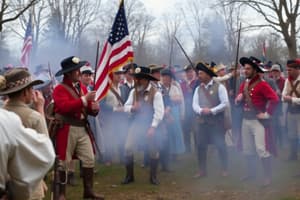Podcast
Questions and Answers
What was the French and Indian War?
What was the French and Indian War?
The French and Indian War in North America (1754-1763) was a conflict between English colonists and soldiers against the French and their Native American allies for dominance in North America.
What was Pontiac's Rebellion?
What was Pontiac's Rebellion?
A 1763 Indian rebellion led by chief Pontiac against British forts in the west.
What did the Proclamation of 1763 establish?
What did the Proclamation of 1763 establish?
It forbade British colonists from settling west of the Appalachian Mountains and required any settlers already living there to move back east.
What was the Sugar Act?
What was the Sugar Act?
What did the Quartering Act require?
What did the Quartering Act require?
What was the Stamp Act?
What was the Stamp Act?
What was the significance of the Declaratory Act?
What was the significance of the Declaratory Act?
What did the Townshend Act impose?
What did the Townshend Act impose?
Who was Patrick Henry?
Who was Patrick Henry?
What were the Sons of Liberty?
What were the Sons of Liberty?
Who was Samuel Adams?
Who was Samuel Adams?
What is Paul Revere known for?
What is Paul Revere known for?
What happened during the Boston Massacre?
What happened during the Boston Massacre?
What was the Boston Tea Party?
What was the Boston Tea Party?
What were the Intolerable Acts?
What were the Intolerable Acts?
What were the Coercive Acts?
What were the Coercive Acts?
What did the Quebec Act do?
What did the Quebec Act do?
Flashcards are hidden until you start studying
Study Notes
French and Indian War
- Occurred from 1754 to 1763, coinciding with the Seven Years War in Europe.
- Conflict between English colonists and French, supported by Native American alliances.
- Resulted in English control over vast territories and diminished French influence in North America.
Pontiac's Rebellion
- Took place in 1763, led by Native American chief Pontiac.
- Aimed to resist British encroachment in the West post-war by attacking British forts.
Proclamation of 1763
- Issued to prevent colonial expansion west of the Appalachian Mountains.
- Required settlers already in the area to relocate eastward.
Sugar Act
- Enacted in 1764 to help Britain recover debts from the French and Indian War.
- Imposed tariffs on sugar, coffee, wines, and molasses, leading to colonial smuggling and bribery to evade taxes.
Quartering Act
- Passed in 1765, mandated colonies to supply food and housing for British troops.
- Viewed as a violation of colonial rights and privacy.
Stamp Act
- Introduced in 1765 as part of financial reforms following the Seven Years War.
- Imposed direct taxes on printed materials and legal documents, igniting protest over "no taxation without representation."
- Repealed in 1766 due to increasing public outcry.
Declaratory Act
- Enacted in 1766 alongside the repeal of the Stamp Act.
- Asserted Parliament's authority to legislate for the colonies in all matters.
- Aimed to restore order and re-establish trade following unrest over previous taxes.
Townshend Act
- Instituted in 1767, imposed taxes on imported goods like glass and tea.
- Resulted in widespread colonial boycott of British products in protest.
Patrick Henry
- Founding father known for his passionate advocacy for independence.
- Famous for the declaration "Give me liberty, or give me death!" and served as Governor of Virginia.
Sons of Liberty
- Formed in 1765 as a radical group advocating for colonial independence.
- Engaged in protests, including riots and destruction of customs houses.
- Leaders included prominent figures like Samuel Adams and Paul Revere; evolved into Committees of Correspondence post-Stamp Act.
Samuel Adams
- Key figure in the American Revolution and founder of the Sons of Liberty.
- A vocal proponent of independence and a signer of the Declaration of Independence.
Paul Revere
- Notable American silversmith recognized for his midnight ride to alert colonists of British troop movements in 1775.
Boston Massacre
- Incident in which British soldiers shot into a crowd of colonists in 1770, killing five.
- Used by the Sons of Liberty to galvanize anti-British sentiment.
Boston Tea Party
- Demanding to protest against tea taxes, colonists disguised as Native Americans dumped tea into the harbor in 1773.
Intolerable Acts
- A set of four punitive laws passed in 1774 in response to the Boston Tea Party.
- Included the closing of Boston's port, restrictions on colonial assemblies, legal protections for British officials, and expanded troop quartering.
Coercive Acts
- Comprised four acts aimed at punishing Massachusetts following the Boston Tea Party:
- Closed Boston's port until tea damages were compensated.
- Reduced Massachusetts legislative power while enhancing royal governor authority.
- Allowed trials of royal officials in England instead of colonies.
- Made quartering British troops in private homes mandatory across all colonies.
Quebec Act
- Passed in 1774, broadened the territory of Quebec and recognized the rights of French Canadians, provoking further discontent among the colonies.
Studying That Suits You
Use AI to generate personalized quizzes and flashcards to suit your learning preferences.




